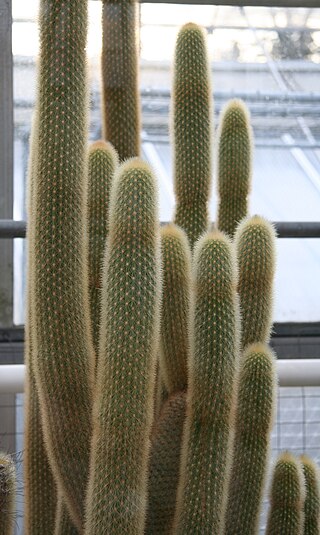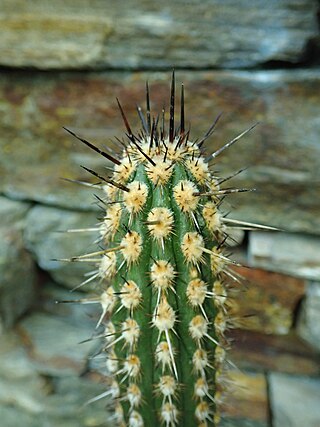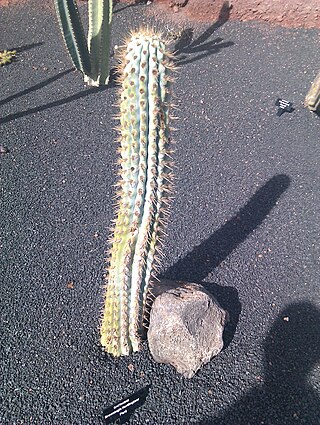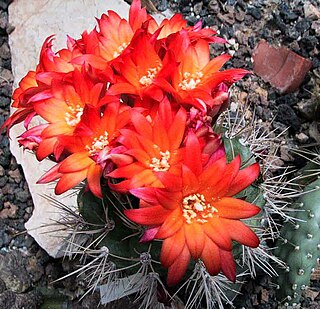
Espostoopsis is a monotypic genus of cactus containing the single species Espostoopsis dybowskii. The generic name is formed from Greek opsis meaning "view", referring to its resemblance to the genus Espostoa, with which it is often confused. The plant is only known from northern Bahia, Brazil.

Samaipaticereus is a monotypic genus of cactus containing the sole species Samaipaticereus corroanus. It is known only from East Andean Bolivia and Peru.

Yungasocereus is a monotypic genus of cacti. Its sole species is Yungasocereus inquisivensis, native to Bolivia.

Cleistocactus winteri is a succulent of the family Cactaceae. Its common name is the golden rat tail. Cleistocactus winteri subsp. colademono, as its synonym Cleistocactus colademononis, has gained the Royal Horticultural Society's Award of Garden Merit.

Haageocereus fascicularis commonly known as 'Quisco de la precordillera de Arica' is a species of cactus from the family Cactaceae. It is endemic to southern Peru and northern Chile.

Cleistocactus tominensis is a species of columnar cactus in the genus Cleistocactus, endemic to Bolivia, where it is found in forests, on cliffs, and in inter-Andean valleys at altitudes of 900 to 2,200 meters.

Weberbauerocereus cuzcoensis is a species of Weberbauerocereus from Peru.

Weberbauerocereus rauhii is a species of Weberbauerocereus from Peru.

Oreocereus trollii, commonly known as the Old Man of the Andes cactus, is a species of cacti native to Argentina and Bolivia. Though listed as Least Concern by the IUCN, the plant is collected extensively, and in some areas is threatened.

Corryocactus erectus or is a species of columnar cactus found in Peru.

Weberbauerocereus cephalomacrostibas is a species of cactus in the family Cactaceae. It is found in Arequipa Department, Peru and consists of 2 subpopulations.

Browningia hertlingiana is a species of Browningia found in Peru.

Matucana ritteri is a species of Matucana found in Peru.

Matucana oreodoxa is a species of Matucana found in Peru.

Cleistocactus buchtienii is a species of columnar cacti in the genus Cleistocactus.

Weberbauerocereus albus is a species of Weberbauerocereus from Peru.

Weberbauerocereus winterianus is a species of Weberbauerocereus from Peru.

Oreocereus ritteri is a species of Oreocereus found in Peru.

Loxanthocereus xylorhizus is a species of Loxanthocereus found in Peru.

Cipocereus crassisepalus is a species of cactus endemic to the state of Minas Gerais in Brazil.




















